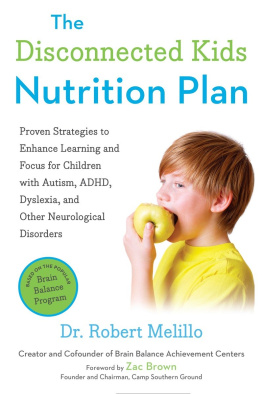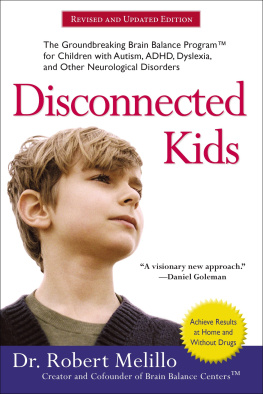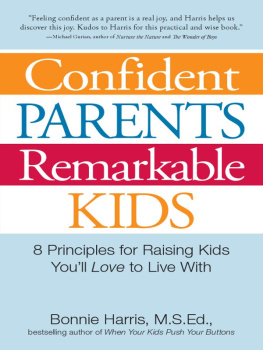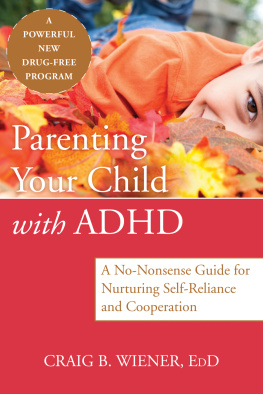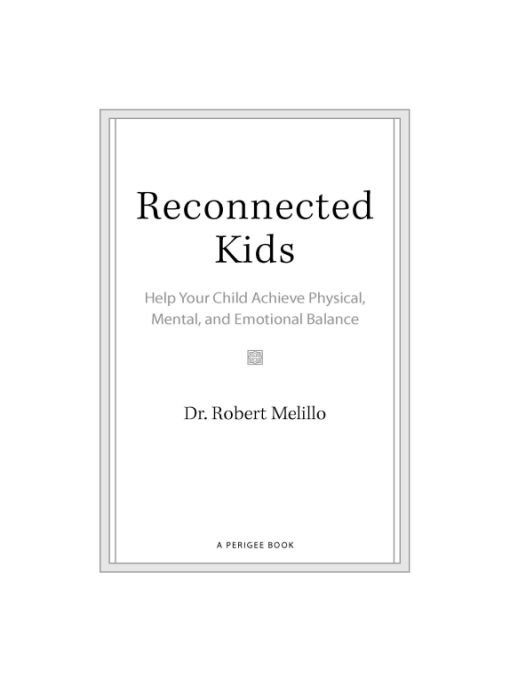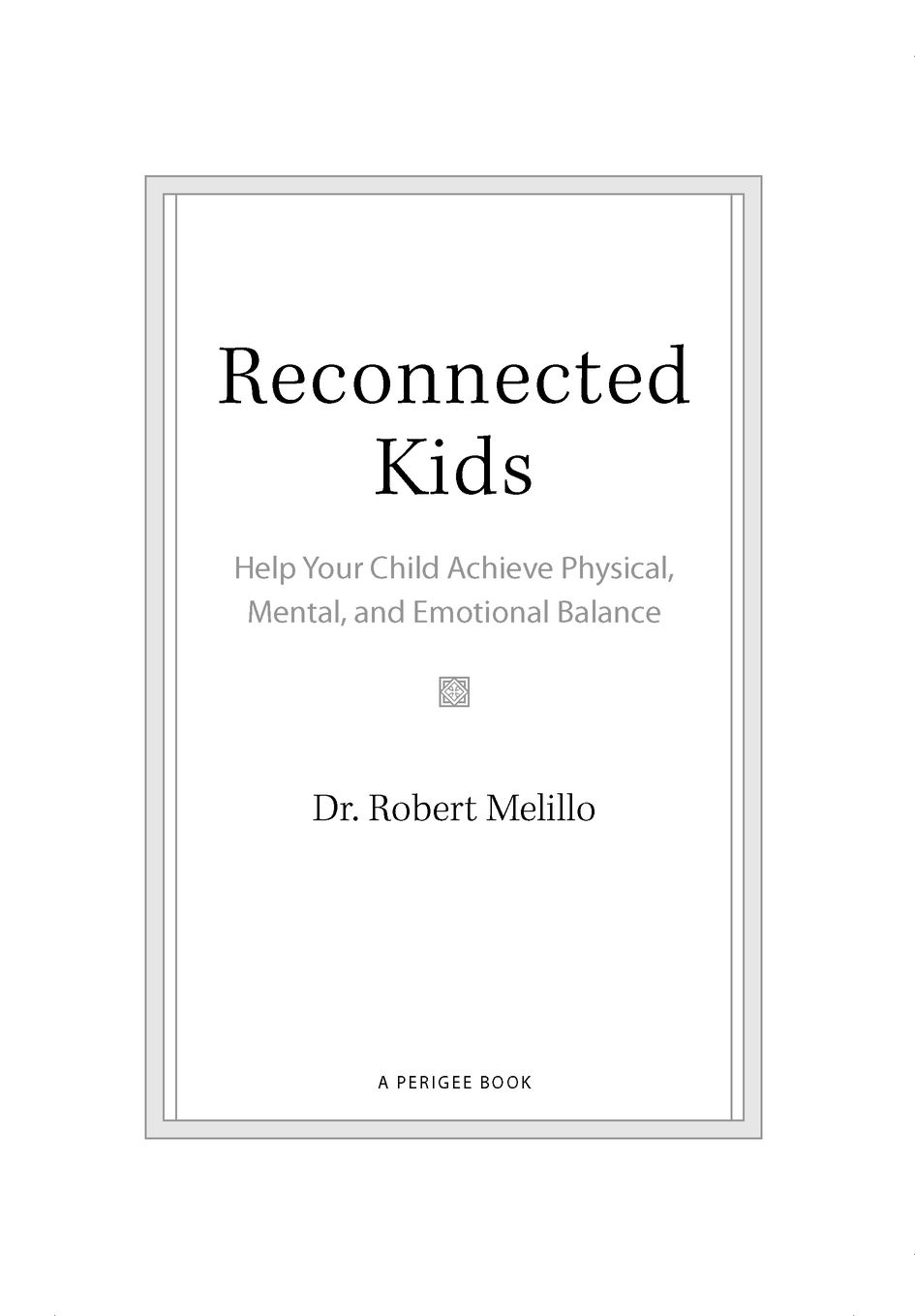Table of Contents
To my parents, Catherine and Joseph Melillo
ACKNOWLEDGMENTS
To my parents, Catherine and Joseph Melillo, who taught me the most about parenting and unconditional love. Thank you for all your support and love for me and my family. To my wife, Carolyn Melillo, the most beautiful woman and best mother I have ever known. Nothing is possible without you, and with you nothing is impossible. Thank you for your love, support, and strength. To my children, Robby, Ellie, and Ty. You constantly challenge and inspire me. I love you all more than life itself. Everything I do is ultimately for you. To my business partner and nephew, Bill Fowler. None of this would have happened without your dedication, love, and inspiration. To my sister, Susan, and her husband, Bill; my brother, Domenic, and his wife, Susan; and all my nieces and nephews, Jeff, Carolyn, Katie, Colleen, Keith, Joey, Alexandra, Olivia, and Nick. I love you and thank you all. Also to my Brain Balance Family who are on the front lines every day helping children and their families. It is an honor to work side by side with you every day. To my agent, Carol Mann, and her staff. Thank you for making my books a reality. A special thank-you to my editors at Perigee, Marian Lizzi and Christina Lundy, who worked so diligently on this manuscript, and Candace Levy, for her wonderful attention to detail. Lastly, to Debora Yost. You are such a pleasure to work with and your insight is so valuable to me. Thank you.
FOREWORD
It was becoming increasingly clear that, by the age of three, my son was not reaching developmental milestones as expected. His pediatrician confirmed that standing, walking, first words, and sentences were all late. His delayed development qualified him to receive early intervention from a local community clinic. It was at that point that my wife and I began to realize we needed more than just a vague diagnosis with very few answers.
As a child and family psychologist for more than thirty years, I have worked with children in various Boston hospitals, psychiatric clinics, and universities. My early training was in neuropsychology at New England Medical Center, followed by a fellowship at Harvard Medical School in couples/family therapy, which led to a busy clinical practice and research. One would think that with this background I was well prepared to manage and understand exactly what needed to be done, but that was not the case. The researcher in me searched professional journals and articles looking for answers. The clinician in me consulted my professional colleagues. The father in me talked to other parents and scoured books for clarity. The only acceptable solution for our family was to find a clear understanding of our sons problem that was linked with an acceptable therapeutic intervention. Thus, as parent, researcher, and clinician, I began a journey that would eventually and serendipitously bring Robert Melillo and me together.
One day, while browsing in my local bookstore, I noticed on the top shelf, in the childhood disabilities section, a title that really caught my attention, Disconnected Kids. I opened Robert Melillos book to page twenty-eight and just started reading. One particular section caught my eye regarding developmental milestones. One new skill leads to another new skill and it is supposed to happen at an expected point in time. When it doesnt, it is a warning flag. He goes on to say, Milestones are the obvious checkpoints that brain development is not going according to natures schedule. This happens when the electrical activity that generates brain growth gets out of timing. As I continued to read, I found a wonderful, refreshing, and hopeful way of thinking about my research, my patients, and my sons difficulties.
Both Dr. Melillo and I have chosen careers treating children and families with various neurological deficits for more than three decades. Both of us are involved in childhood neurodevelopmental disorders research and strive to be on the cutting edge of new medical and psychological therapies. Not only are we concerned with the abundant use of psychopharmacological remedies for children with behavioral problems, but also we have taken it upon ourselves to bring new, creative clarity to the myths and misunderstandings of how the brain works.
As kids and parents work through Melillos Brain Balance Program, new challenges emerge. A major challenge for parents is readjusting the family system to behavioral changes in the childthe primary focus of this book. In Reconnected Kids, Melillo likens the childs brain with functional disconnect to a symphony orchestra where the conductor (brain) allows the two sides (left and right hemispheres) to become out of sync with each other. To fix the problem all the instruments need to be brought back to the correct rhythm, harmony, and key. Simply correcting the violins isnt enough; the rest of the orchestra needs adjustment as well. Similarly most neurological systems in disharmony require more than one solution to correct imbalances. To address only an auditory or visual processing problem, a nutritional problem, a reading problem, or a dysfunctional family problem alone is not enough. Melillos emphasis on correcting the entire orchestra is right on target.
Melillos Family Empowerment Program not only offers another way of thinking about these childhood neurological disorders but also adds specific treatment recommendations. His program takes the next step in providing parents and practitioners with a clinically innovative and academically grounded approach to treating children with neurological deficits, as well as an intervention process that has widespread potential. In Reconnected Kids, Melillo has reached beyond psychopharmacological solutions and conventional, maybe outdated, therapies and brings a refreshing, hopeful, and scientifically responsible approach to the field of childhood neurological disorders.
All the best to you and your children.
Leslie Philipp Weiser, MPh, PhD
McLean Hospital, Harvard Medical School,
Belmont, Massachusetts
INTRODUCTION
Reconnecting with Your Kids
In my first book, Disconnected Kids, I presented parents of children with some of the most distressing neurological challenges with proven, practical solutions to their childrens most perplexing behavior problems. As with many groundbreaking books, the book raised a few questions. It even raised a few eyebrows.
Disconnected Kids was groundbreaking because, unlike most experts who confront children with problems such as autism and Aspergers syndrome, I was confident enough to tell parents that there is hope their child can get bettersignificantly better. I said it is not out of the realm of possibility that they could even be cured. I gave hope to parents of kids with attention deficit/hyperactivity disorder (ADHD), dyslexia, and other learning disabilities that, absolutely, their children have a chance of succeeding in school and life just like every other normal child. And I was armed with the proof: more than a decades worth of research and study and more than a thousand children who have successfully gone through my Brain Balance Program.
Disconnected Kids was also groundbreaking because it was the first (and still the only) book to view all behavior and learning disorders from a neurological perspectivethat is, as


